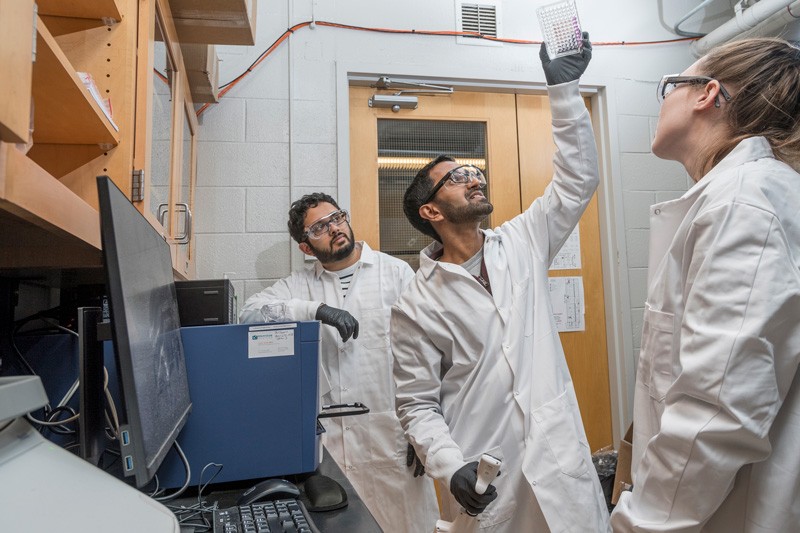Chemical engineering professor to participate in highly selective fellowship program
Aditya Kunjapur, an assistant professor in the Department of Chemical and Biomolecular Engineering at the University of Delaware, has been named to the Johns Hopkins Center for Health Security’s Emerging Leaders in Biosecurity Initiative fellowship program in 2019.
Kunjapur joins 30 people from 13 U.S. states, Canada, and the United Kingdom who were selected from more than 130 applicants. Throughout the year, the fellows will attend three multi-day workshops, participate in networking opportunities and engage with top experts in domestic and global health security.
Kunjapur and his peers in the Emerging Leaders in Biosecurity Initiative fellowship program will discuss ways to ensure that emerging technologies are not used in ways that endanger human lives or the planet. They contribute a diverse set of expertise including public health, ethics, national defense and more.

Using gel electrophoresis, a technique to separate and study proteins and DNA, Kunjapur and his students are exploring ways to modify living cells so that they can produce fuels and other useful chemicals.
Kunjapur brings expertise in synthetic biology, a field devoted to making biology easier to engineer.
“My lab seeks to enable living systems to produce and tolerate the kinds of chemical functional groups and reactions that are often only achieved in non-living environments by chemists,” said Kunjapur, who joined UD in 2019. Many scientists are utilizing microbes for their ability to produce other chemicals, such as fuels, and Kunjapur wants to use biological substances as chemical factories or protein factories.
“I’m very interested in sustainable chemistry using biomanufacturing platforms,” said Kunjapur. “If I achieve my dream of being able to put more and more unusual functional groups either on proteins or small molecules, it starts to blur the lines between what we think of as chemical and biological, and that’s where some of the risks come into play that first got me interested in this biosecurity space.”
As the field of synthetic biology advances, biology is becoming increasingly democratized. Think about the early adopters of computing technology who built computers in their garage. As genetic engineering becomes simpler, hobbyists might start to do it, too. This could accelerate the pace of beneficial discoveries but could also contribute problems around biohazards. People could exploit the science to make weapons, drugs or other illicit materials.

These gels are composed of agarose, creating a matrix that helps separate DNA. Given the negative charge of DNA, it moves through the gel at a velocity that is inversely proportional to its size when an electric field is applied.
“I think it’s important to have a high-level mindset, especially early in your career, to think about how technology in your field can present both good things as well as potentially some things of concern for society,” said Kunjapur. “Synthetic biology itself presents opportunities and potential risks within biosecurity.”
As Kunjapur builds his laboratory at UD, he will incorporate the wisdom he gains as an Emerging Leaders in Biosecurity Initiative fellow. As a synthetic biology expert, he is in good company at the University, where he can learn from fellow experts such as Wilfred Chen, Gore Professor of Chemical and Biomolecular Engineering; Terry Papoutsakis, Unidel Eugene du Pont Chair of Chemical and Biomolecular Engineering; Maciek Antoniewicz, Centennial Professor of Chemical and Biomolecular Engineering; and Kelvin Lee, Gore Professor of Chemical and Biomolecular Engineering. He also looks forward to working with UD students.
“The students who joined my lab consistently impress me with their motivation, eloquence, and way of thinking about their projects,” said Kunjapur. “As investigators in academia, our success is largely dependent upon our students, and their high quality here at Delaware inspires confidence that we will reach our highest heights together.”

Graduate students Morgan Sulzbach (left) and Sabyasachi (Sunny) Sen, and Aditya Kunjapur (right), an assistant professor of chemical and biomolecular engineering, prepare to examine a DNA sample.

